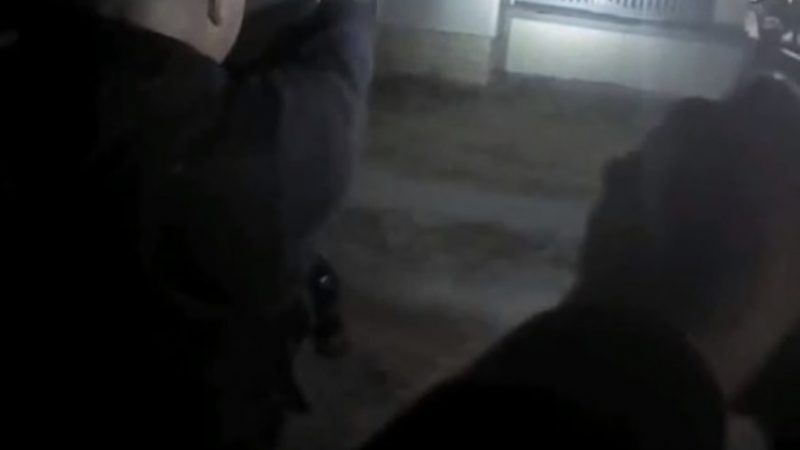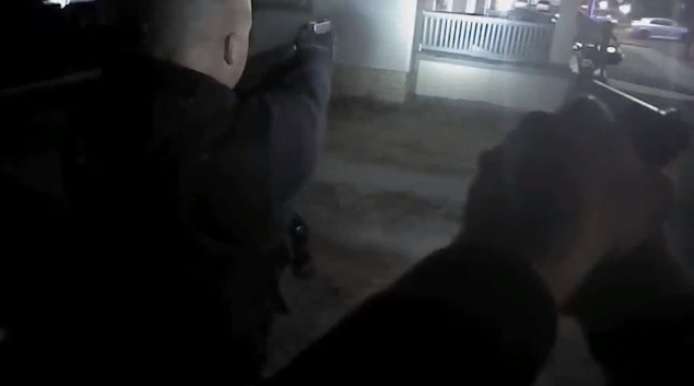No Charges for Wichita Officer Who Killed Innocent, Unarmed Man in 'Swatting'
It's considered "reasonable" for police to kill based on false information.


A Kansas district attorney announced yesterday that a police officer who shot an unarmed man on his own porch will not face charges because the officer was operating under the impression that he was responding to a hostage situation.
The fatal shooting of Andrew Finch in Wichita, Kansas, drew national attention in December, as it appeared to be the first case of a "Swatting" call turning deadly. "Swatting" is a particularly nasty prank in which someone calls 911 and falsely claims to be involved in a dangerous hostage situation, drawing a SWAT raid to somebody else's home and terrifying the targets.
In this case, a Los Angeles man reportedly made the false call as a result of some video game dispute. Finch wasn't even involved in the dispute; the suspect, Tyler Barriss, was given Finch's address by the person he was arguing with. Barriss allegedly called 911 and claimed to have shot his own dad at Finch's address and to be holding a family hostage.
Police arrived armed and prepared for a hostage situation. According to Finch's family, Finch saw the police lights outside and—not realizing that his own home was their target—went out on the front porch to see what was happening. Ten seconds later he was shot and killed by police.
District Attorney Marc Bennett investigated the shooting. His conclusion:
The officer believed Mr. Finch was the suspect who had shot his own father and had been holding his younger brother and mother hostage. This officer perceived these movements by Mr. Finch and believed the subject that he was looking at, Mr. Finch, was reaching for the gun that he would have used to shoot his father moments earlier. The officer believed he saw a gun come up in Mr. Finch's hands. The officer stated that he discharged his weapon, thinking that Mr. Finch presented an imminent risk to the officers.
But Finch didn't have a gun, he wasn't an imminent risk, and there was no hostage situation. The police have been granted permission to shoot to kill on the basis of a prank call. The Wichita Eagle notes that because the officer isn't being charged, the police won't even release the cop's name. The family is suing in civil court as well, but the city (and the taxpayers) will be held accountable for a financial settlement, not the police department.
This is a terrible decision for a couple of reasons. First, it reinforces a culture in which officers are permitted to shoot and kill anybody on the basis of their own fears and to believe the worst in any encounter. This law enforcement culture puts all of us at risk in every encounter with police. If a completely harmless man can be shot on his own porch and police can say they thought he was reaching for a weapon, that's a terrible way to protect public safety.
And knowing that police can avoid responsibility for these shootings actually incentivizes "swatting" calls. If police knew they could face consequences for reacting rashly to such calls, they'd be more careful. If they're more careful, their responses to these calls won't cause the results the pranksters want.
Instead, there's a push to increase the penalties for making these swatting calls. Barriss faces manslaughter charges, and various people want to increase the punishment he faces for his role in making this happen. And perhaps he should face tougher penalties. But shielding the police from punishment also shields them from pressure to make changes that would make such shootings less likely. The goal shouldn't just be to punish swatters. Police have to change the way they approach these calls in the first place, in order to make sure there is actually a hostage situation happening. California lawmakers, for example, are considering a bill to change the threshold for police to be permitted to use deadly force; the law would require that there be an imminent threat with no other reasonable alternatives.


Show Comments (125)